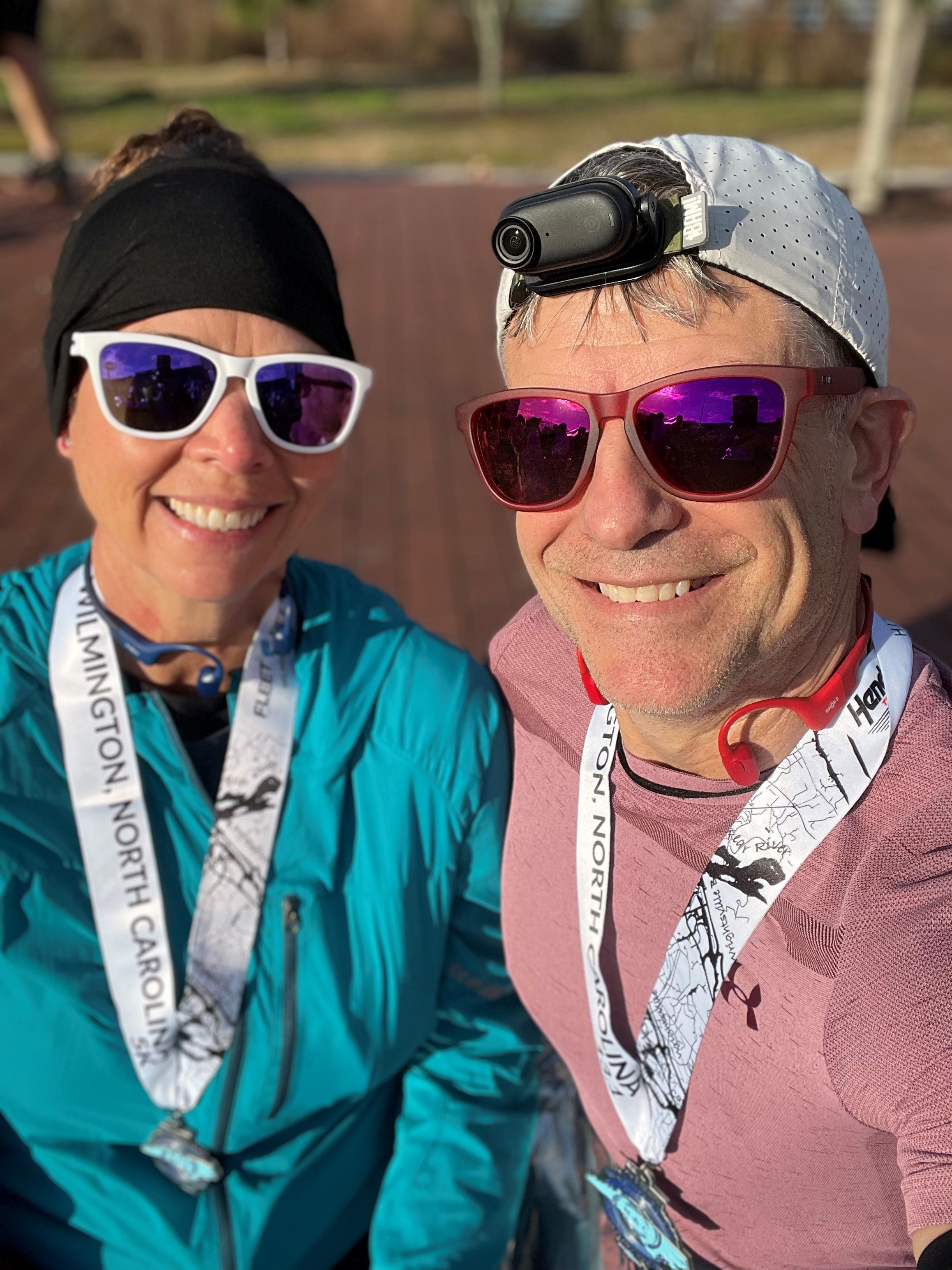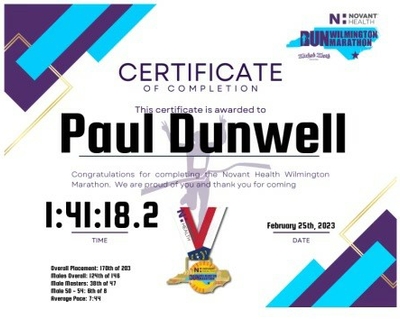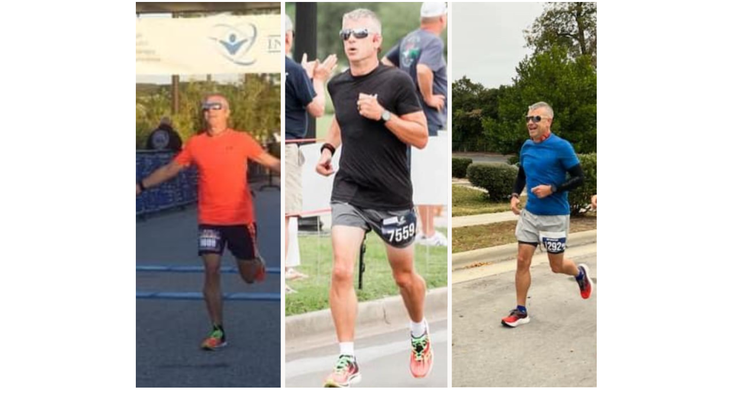Paul Dunwell is highly accustomed to anticipating and planning for emergency situations. The 53-year-old resident of Shallotte, North Carolina, is the fire and rescue chief for the town, and has worked in emergency fire services for 36 years. In his job, his top priority is making sure all personnel and firefighters go home safely to their families each day, and he plans meticulously to make sure this happens.
What Dunwell didn’t plan for was a medical emergency that would threaten his own life. In May 2021, he had a feeling of general unwellness he just couldn’t shake. He reached out to his primary care clinician, family nurse practitioner Matthew Lucas at Novant Health Oceanside Family Medicine – Shallotte. Tests soon revealed Dunwell was experiencing atrial fibrillation, an irregular heartbeat caused by chaotic signals in the upper chambers of the heart.
This was the start of Dunwell’s heart health journey, one that he’s still traveling. Along the path, he discovered a new passion that drives him: running. And this month, he’ll run in the Novant Health Wilmington Marathon, competing in the 13.1-mile half marathon race, for the second consecutive year. Today Dunwell has stood atop 10 race podiums and run thousands of miles – and he says he’s in the best shape of his life. Here’s how his health care team at Novant Health helped him get there.
Novant Health provides some of the nation's best individualized heart and vascular care.
‘The longest six months of my life.’
In his profession, Dunwell’s always led a pretty active life. Plus, he was accustomed to walking to and from work each day, 3 miles round trip, an advantage of living in the small town of Shallotte. So when he began to experience very low energy and feelings of malaise, he knew something was wrong.
Lucas arranged for Dunwell to receive a heart monitor. In a healthy heart, the beat rate is controlled by electrical signals that cause the heart to contract at a coordinated rate, circulating blood to the lungs and the rest of the body, delivering oxygen. Dunwell’s monitor revealed his irregular heartbeat, which was causing his fatigue and weakness.
Atrial fibrillation, or AFib for short, is one of the most common types of irregular heartbeats. The Centers for Disease Control and Prevention estimates that by the year 2030, more than 12 million people in the United States will have AFib. It puts people at risk of other dangerous heart-related complications, like heart failure and stroke.
For some, AFib can be effectively controlled with medication. But Dunwell didn’t improve, even while strictly following a regimen of prescribed medication and avoiding caffeine and alcohol.
“The symptoms were worsening by the day,” he said. “For every hour I was in AFib, it would take two hours to recover.”
Twice during July, his colleagues at the firehouse rushed him to the emergency department at Novant Health Brunswick Medical Center. Dunwell could hardly function. He relied on his wife, Dona, and his colleagues to drive him to medical appointments and make sure he made it to and from work each day. Quality time with his son, Paul, was suffering. His spark was gone.
In October 2021, when Lucas told him it was time to consider a medical procedure, Dunwell was ready for it. It was taking him 90 minutes to walk 1 mile when it used to take 15 minutes.
“I didn’t like what I was feeling,” he said. “It had been the longest six months of my life.”
‘I never felt so good!’

Dr. Michael Yarnoz, a cardiac electrophysiologist with Novant Health’s Heart & Vascular Institute - Wilmington Main, fixed Dunwell’s AFib in November. He used an outpatient procedure called ablation, which involves freezing small areas to create scarring inside the heart, accessed through the femoral veins in the groin.
This breaks up the signals that cause irregular heartbeats, and helps the heart maintain a natural rhythm. Yarnoz said that in recent years, electrophysiologists have increasingly used ablation to correct AFib because improved tools have helped make the procedure more efficient.
“We don't have to be inside people's hearts as long, so there’s less risk of complications, and less need for anesthesia,” he said.
Dunwell did experience an unforeseen complication. The access site in his upper thigh began to ooze blood when he stood up after the procedure. His nurses reacted quickly, he said, to elevate his legs while they applied pressure to his femoral vein. To ensure the bleeding had halted and that Dunwell could return home safely, Yarnoz recommended an overnight stay. It was unexpected, but Dunwell didn’t stress it.
“Everybody treated me very well,” he said.
Dunwell has little memory of the days leading up to the procedure. What he remembers most is the day after, when he awoke in his hospital room. “I remember waking the following day and telling my wife, ‘It feels like a tornado of wind in my chest.’ I never felt so good!” he said.
Dunwell was motivated to discontinue his heart medications. Over the next few months, by carefully following Yarnoz’s recommendations, he gradually reduced, then stopped them, meeting his goal.
Picking up the pace
A follow-up stress test in April 2022 brought about Dunwell’s biggest surprise. He was tasked with running on a treadmill to measure how well his heart was maintaining its rhythm following his ablation procedure. Dunwell said he was nervous. A strong clinician stood next to the treadmill in case he fell, and reassured him, “I got you.”
As Dunwell ran on the treadmill and his confidence increased, he realized – he could keep going. And when he stepped off the treadmill, he felt great. So good, in fact, he decided he didn’t want to stop running.
He transitioned from walking to running to work every day. Longer runs became part of his regular routine. He carefully planned the intensity of his runs and tracked his heart rate with the help of his Apple watch. He complemented his runs with a healthy diet, yoga and a routine of static and dynamic stretching. Eventually, he worked his way up to an astonishing habit of running around 150 miles each month.
“I find that running is very therapeutic, and it has become the bridge of who I am to where I want to be,” Dunwell said.
Running into the future

Since that wondrous day on the treadmill, Dunwell has run 2,875 miles across 13 Caribbean islands and three states. He’s participated in three half-marathons and one 10-miler, among many other races. Dona has joined him in several, which he’s chronicled here on his YouTube channel, Run Well With Dunwell. All this, Dunwell said, without any recurrence of his AFib symptoms.
Dunwell has an ambitious race schedule planned for 2024, including the half-marathon race in the Novant Health Wilmington Marathon on Feb. 24. Last year, he ran it in two hours, 20 minutes, 21 seconds. His goal for this year is to finish in 100 minutes. Prior to his first half marathon, he said he was “scared to death,” but when he began to run, he found his groove. Running, he said, is an energy and a vibe that draws him in.
“I’m not racing against anyone,” he said. “I’m just running my race!”
For anyone who is inspired by his story, Dunwell emphasizes how important it is to see a trustworthy medical team, and to follow their guidance.
“That is the essential for us to receive the best possible outcome,” he said. “Matthew Lucas, Dr. Yarnoz and their staff have changed my life. I believe they have given me a second chance at life to undo all the wrongs I've done, be a better husband, be a better father and be a better friend.”

Dunwell completed the half-marathon race of the Novant Health Wilmington Marathon on Feb. 25, 2024. He finished in 101 minutes, just a hair shy of his 100-minute goal. Congratulations, Chief Dunwell!












